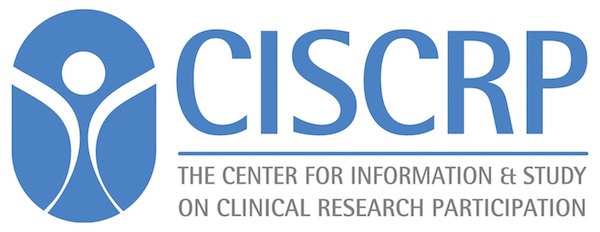
From the Editor…
There is a point in the creation of every organization where someone has to decide on the name. For me, the PRP Alliance was easy. Even the PRP Survival Guide was effortless. But who thought that the Center for Information and Study on Clinical Research Participation would even fit on a business card?
And then there is the acronym. How do you pronounce CISCRP? Fortunately, I’ve attended meetings with people who work at CISCRP headquarters in Boston. Those folks don’t have any problem pronouncing CISCRP.
CIS as in SISter and CRP as in crypt
Now that I have gotten that off my chest, CISCRP is a terrific organization with terrific people who make terrific things happen.
Initially it was their advocacy of lay language and non-technical summaries that attracted me to their website. As a patient with a ultra-rare skin disorder, I was continually frustrated by Abstracts and Case Reports that were impossible to decipher. CISCRP shared my frustration. Unlike me, they were doing something about it.

I ordered and read The Gift of Participation by CISCRP founder, Ken Getz. His “Guide to Making Informed Decisions About Volunteering for a Clinical Trial” was much more than I had expected. The result was a bittersweet realization that there is little PRP research of any consequence. On the other hand there was a  glimmer of hope coming from  Sidney Kimmel Medical College at Thomas Jefferson University in Philadelphia. Since October 2012, genetic and clinical research has been underway with predictable challenges of recruiting participants.
CISCRP is a 501(c) (3) independent national nonprofit organization founded in 2003 with a four-part mission:
(1) Educate, inform and empower patients, the public, medical and research professionals, the media and policymakers about clinical research participation and what it means to be an active participant in the process.
(2) Promote greater awareness and understanding of clinical research participation and the role that it plays in public health
(3) Facilitate more effective collaboration among all members of the clinical research enterprise
(4) Provide resources for the research community to better understand the study volunteer.
As a PRP patient advocate I have been participating on the Clinical Trials Awareness and Accessibility Patient Advisory Board funded by TransCelerate and managed by CISCRP staff. When the dust settles on the CRAA Advisory Board I hope be become an Editorial Panelist and actually be involved in translating medical jargon into lay language. What a hoot for a 71-year-old retired publisher.
Advocacy opportunities for the PRP Community:
(1)  Go to the CISCRP website and devour it. .
(2) Â Participate in webinars
(3) Â Attend “local” conferences sponsored by CISCRP and share what you learn with the PRPÂ Facebook and PRP RareConnect communities.
(4)  Then take what you learn and help Thomas Jefferson  University increase participation in their ongoing PRP Research.
CISCRP
